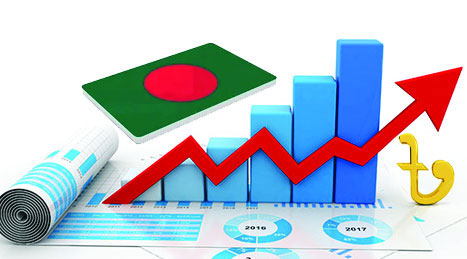Economy turning around in BD
Staff Correspondent: Inflation has come down. In other words, people’s suffering in shopping is getting a little less. Apart from this, there is growth in the export of clothing despite various crises. Expats are sending more remittances than ever before. In this, foreign exchange reserves are gradually strengthening.
Price inflation
Overall inflation in the country fell to 9.41 percent last December, the lowest in the last seven months. This information has emerged in the latest statistics published by the Bangladesh Bureau of Statistics (BBS) on Sunday.
Last October inflation was 9.93 percent. It fell to 9.49 percent in November. Last April it was 9.24 percent. Headline inflation was 9.94 percent in May. According to BBS data, food inflation decreased to 9.58 percent in December from 10.76 percent in the previous month.
According to data from the Bureau of Statistics, headline inflation in rural areas was 9.62 percent in November, which slightly declined to 9.48 percent in December.
It also affects food prices. As a result, food price inflation decreased from 10.86 percent in the previous month to 9.66 percent. The overall inflation rate in urban areas was 9.16 percent in November, it was stable at 9.15 percent in December. However, the fact that the inflationary pressure has decreased slightly has also reduced food prices, according to the BBS report. Food inflation in the city stood at 9.46 percent in December, down from 10.58 percent in the previous month. Meanwhile, the wage rate also increased slightly in December. It was 7.74 percent from 7.72 percent in November.
Remittance
Remittance flows are increasing at the beginning of the new year. In the first 12 days of January, expatriates sent remittances of $91.6 million through legal channels and banking channels. That is, expatriates sent $76.3 million daily. This information is known from the updated report of Bangladesh Bank on Sunday (January 14). According to the data of the Central Bank, in the first 15 days of December, remittances have reached $107 million.
And in the first 10 days of November, expatriates sent remittances to the country through legal channels and banking channels amounting to $794 million.
Garment export
In the 6th month of the current financial year, i.e. July-December, the export earnings of ready-made garments have increased by 1.72 percent. According to the report published by the Export Development Bureau (EPB), the export earnings of readymade garments (RMG) increased by 1.72 percent to $23,391.34 million between July and December of the fiscal year 2023-24. In the same period of last financial year which was $22,996.69 million.
According to BGMEA data, the country’s garment exports in the recently concluded year 2023 have reached $47.39 billion. Which has increased by 3.67 percent compared to last year. According to BGMEA, Bangladesh’s total export earnings increased by 2 percent, most of which came from apparel exports.
In this context, BGMEA director Mohiuddin Rubel told, “2023 is a historic year for the garment industry if we calculate the annual garment export turnover. Bangladesh has done fairly well considering the global economic and geopolitical crisis. This is because most developed countries are struggling to control high inflation and various monetary policy measures taken to control inflation are adversely affecting consumer demand.
Mohiuddin Rubel mentioned that the year 2024 will be a year of change for the apparel sector.
Meanwhile, the United Nations Department of Economic and Social Affairs has predicted a report titled ‘State and Prospects of the Global Economy 2024’ – the average price inflation in Bangladesh may decrease to 6.8 percent in the current year 2024. However, the GDP growth will be slightly reduced to 5.6 percent.
The average inflation in the country in the year 2023 was 9.6 percent. In the new year, it will come down to 6.8 percent. In 2025, it will further decrease to 5.5 percent.
What economists say
When asked about this, the former governor of Bangladesh Bank Atiur Rahman told, “There has been a kind of relief in the society because the election went well. Several indicators of the economy are trending positively. Inflation has come down. Remittances have started to increase. Apart from this, reform programs are being strengthened to stimulate the economy. In the meantime, initiatives have been taken to coordinate between Bangladesh Bank’s monetary policy, fiscal policy and revenue policy of the Ministry of Finance. Initiatives have been taken to reduce various expenses of the government.
Researcher of Bangladesh Development Research Institute BIDS and Chairman of Agrani Bank Zayed Bakht said, “Ordinary investors do not invest before the election. Now that a fair vote has been held, the government has been formed. Now there is political stability. The confidence of the people of the country has come through this election. Businessmen will focus on investment.
Rare Israeli airstrike in Beirut kills Hezbollah commander and more than a dozen others
International Desk: Israel launched a rare airstrike that killed a senior Hezbollah milita…








